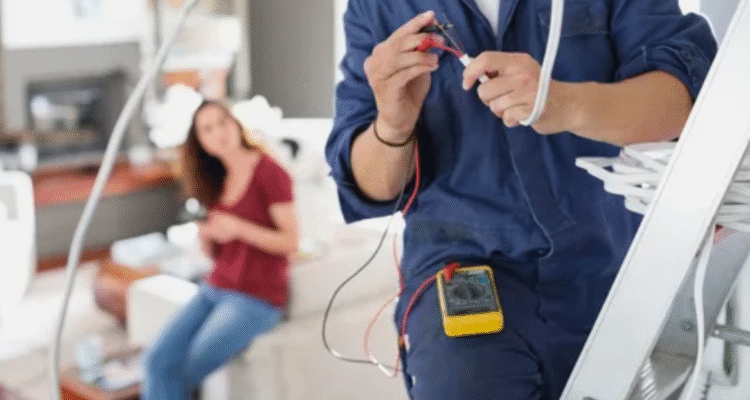When it comes to your home or business, the electrical system is one of the most critical components of safety, functionality, and efficiency. Whether you’re building from the ground up or dealing with a sudden outage, you need professionals you can trust. That’s where emergency electrical services and electrical installation services come into play.
This article explores the importance of both types of electrical services, how they differ, when to use them, and what to expect from a qualified electrician.
What Are Emergency Electrical Services?
Emergency electrical services refer to urgent, unplanned electrical repairs or troubleshooting performed by licensed electricians, typically available 24/7. These services are designed to address electrical problems that pose immediate risks to safety, property, or business operations.
Common Situations Requiring Emergency Electrical Services:
- Power Outages
If your home or business suddenly loses power—and it’s not due to a neighborhood-wide outage—there could be a serious problem with your wiring or electrical panel. - Burning Smell or Sparks
The smell of burning plastic or smoke near outlets or breaker panels is a red flag. Sparks or flickering lights can indicate a short circuit or overloaded system. - Electrical Fire or Shock
If you experience an electrical shock or a small fire due to faulty wiring, call an emergency electrician immediately after dialing 911. - Flood or Water Damage
Water and electricity are a dangerous mix. If your property floods or suffers water damage, you need a professional to inspect and repair any compromised electrical systems. - Breaker Tripping Repeatedly
When a circuit breaker trips repeatedly, it may point to an overloaded circuit, short circuit, or faulty wiring—all of which can be hazardous.
What to Expect from Emergency Electrical Services
When you call for emergency electrical services, a qualified electrician will:
- Quickly assess the situation.
- Perform immediate diagnostics using specialized tools.
- Provide temporary or permanent solutions based on severity.
- Ensure safety and restore essential power.
- Offer expert advice on further repairs or replacements if needed.
Emergency electricians often carry a wide range of tools and replacement parts in their vehicles to resolve most issues on the spot.
What Are Electrical Installation Services?
Unlike emergency services, electrical installation services are typically scheduled in advance and involve setting up new electrical systems or components in a home or commercial building. These services are essential during construction, renovation, or system upgrades.
Types of Electrical Installations:
- Wiring and Rewiring
New buildings need complete wiring systems. Older properties may need rewiring to meet modern safety standards. - Lighting Systems
Electricians install both interior and exterior lighting, including energy-efficient LED systems, smart lighting, and custom designs. - Electrical Panels and Circuit Breakers
Upgrading or installing a new electrical panel ensures your property can handle today’s energy demands safely and efficiently. - Appliance Installation
High-voltage appliances like ovens, dryers, HVAC systems, and EV chargers often require dedicated circuits and professional installation. - Smart Home Systems
From automated thermostats to home security, electrical installation services bring smart technologies to life. - Commercial Electrical Installation
Office buildings, factories, and retail spaces have unique needs, such as server room wiring, industrial machinery hookups, and energy management systems.
Why Hire a Professional for Electrical Installation Services?
Electrical work is not a DIY job. Hiring licensed electricians ensures:
- Safety Compliance: Professionals follow national and local codes.
- Insurance and Liability: Work done by certified contractors is typically covered by insurance policies.
- Efficiency: Pros get the job done faster and more accurately.
- Inspection and Approval: Many installations require permitting and inspection to meet regulations.
Emergency vs. Installation Services: Key Differences
| Feature | Emergency Electrical Services | Electrical Installation Services |
| Timing | Immediate or same-day response | Scheduled in advance |
| Purpose | Restore safety and power | Add or upgrade electrical systems |
| Common Scenarios | Outages, sparks, shocks, electrical fire | Renovations, new builds, smart systems |
| Tools and Materials | Diagnostic and repair tools | Installation equipment and components |
| Cost | Often higher due to urgency | Varies based on project scope |
Signs You May Need Both Services
In many cases, a property may require both emergency electrical services and electrical installation services within a short period. For example:
- After a storm damages your outdoor electrical systems, emergency services are needed to restore power, followed by installation services to upgrade outdated infrastructure.
- A business may experience frequent breaker issues (emergency) and realize it’s time to install a higher-capacity electrical panel (installation).
Choosing the Right Electrical Service Provider
Here’s what to look for in a reliable electrician or electrical service company:
- Licensing and Certification
Ensure the electrician is certified by your state or local government. - 24/7 Availability
For emergencies, you need someone who responds any time, day or night. - Experience and Reviews
Look for providers with strong customer reviews and a track record of successful installations and emergency repairs. - Upfront Pricing
Trustworthy electricians provide clear estimates and transparent billing. - Warranty and Guarantee
Choose companies that back their work with warranties and satisfaction guarantees.
Tips to Prevent Electrical Emergencies
- Routine Inspections: Have your system checked annually by a licensed electrician.
- Upgrade Old Wiring: Especially in homes over 30 years old.
- Avoid Overloading Circuits: Don’t plug too many devices into a single outlet.
- Install Surge Protectors: Protect appliances during storms and power surges.
- Use GFCI Outlets: Especially in kitchens, bathrooms, and outdoor areas.
Conclusion
Whether you’re in need of urgent help or planning your dream renovation, both emergency electrical services and electrical installation services play crucial roles in keeping your property safe and functional. Don’t wait until a small issue turns into a major hazard. Partner with a licensed, reliable electrician who offers both services to ensure your electrical system is always up to code and working properly.
By investing in professional electrical support, you’re protecting your property, your people, and your peace of mind.
